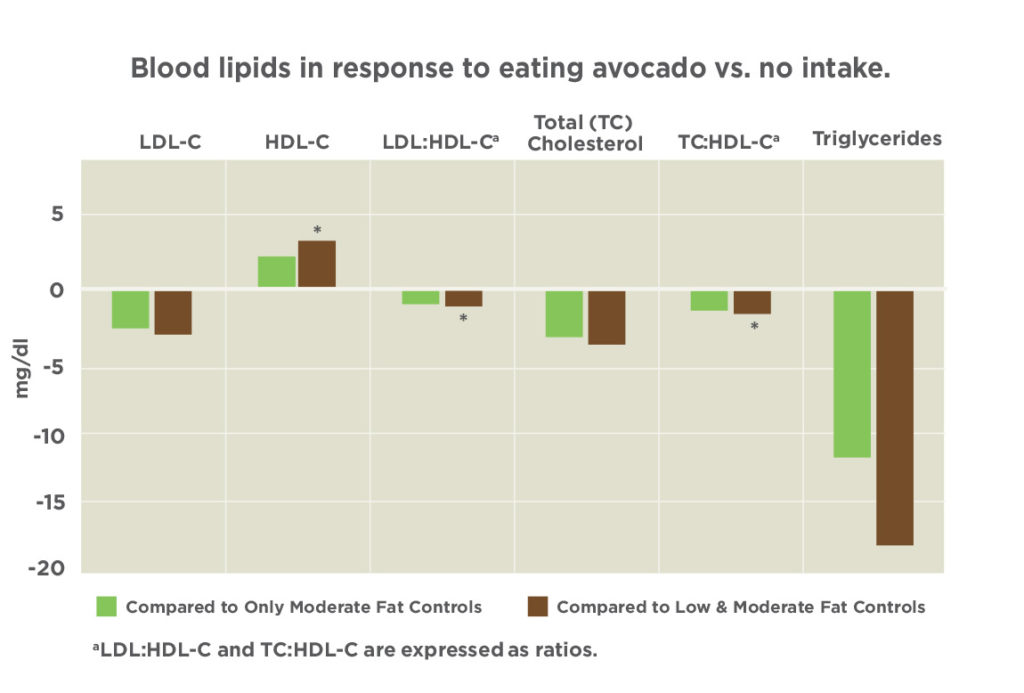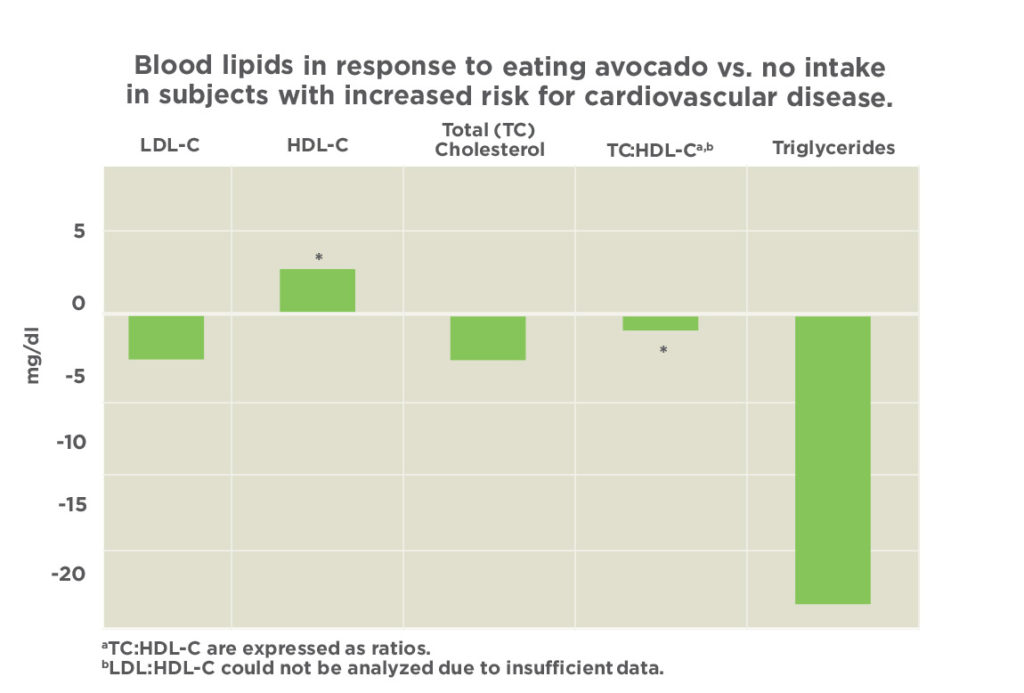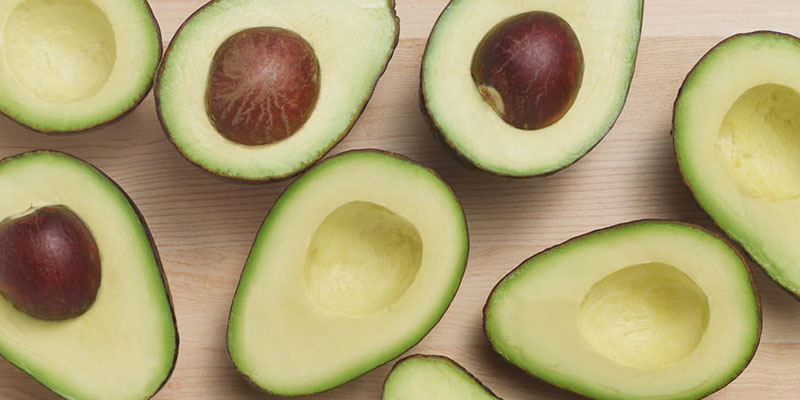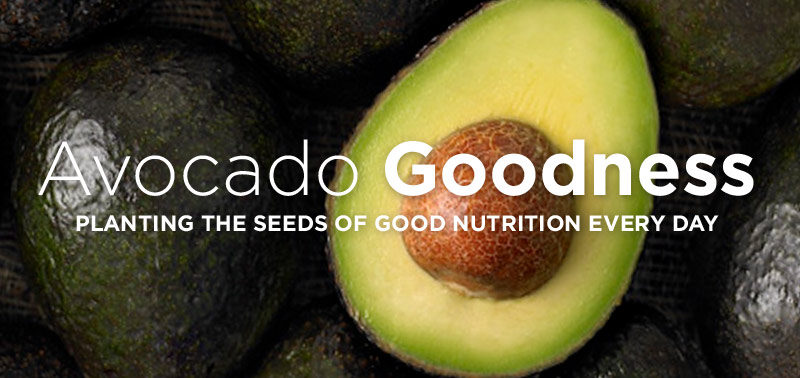Study Overview
The study was supported by the Hass Avocado Board (HAB). Given avocados contain nutrients and phytochemicals that have been associated with cardiovascular benefit, a meta-analysis was conducted to assess the effect of avocado intake on cardiometabolic outcomes of cardiovascular disease.
In this study, researchers found that, compared to low-fat and moderate-fat avocado-free diets, avocado consumption resulted in a statistically significant increase in HDL-C and decrease in TC:HDL-C and LDL:HDL-C ratios. In sub-analysis, subjects with elevated cardiometabolic risk at baseline also yielded a statistically significant increase in HDL-C and decrease in TC:HDL with consumption of avocado, compared to no intake. However, avocado intake was not related to a change in serum total cholesterol (TC), LDL-C, triglycerides (TG) or HDL-C.
For healthy living, increased HDL-C is desirable while decreased total cholesterol (TC), LDL-C, TC:HDL, LDL:HDL and triglycerides are desirable. TC:HDL is the most powerful predictor of ischemic disease mortality
Published: April 2018, The American Journal of Clinical Nutrition
Study funded by Hass Avocado Board
Category: Cardiovascular Health, Weight Management
See Published Study
Download Scientific Summary PDF
Key Takeaways
Consumption of avocado
did not alter body weight.
Avocado intake resulted in a statistically significant increase in HDL-C and decrease in TC:HDL-C and LDL:HDL-C when compared with controls that consumed low-or moderate-fat avocado-free diets.
Subjects with elevated cardiometabolic risk at baseline yielded a statistically significant increase in HDL-C and decrease in TC:HDL-C with consumption of avocado compared to no intake.
Avocado intake is not related to a change in serum total cholesterol (TC), LDL-C, triglycerides (TG) or HDL-C compared with consumption of moderate-fat avocado-free diets.

- One-third of a medium avocado contains 5 grams of monounsaturated fat (MUFA) and is a good source of fiber.
- Higher MUFA intake has been associated with overall reduced risk for cardiovascular mortality (12% risk reduction for 5% exchange of MUFA for saturated fat).
- Fiber intake has been associated with lower risk of cardiovascular disease (9% decrease per 7 grams fiber increase).
- Blood lipids are a primary risk factor for cardiovascular health.
Study Details
This study conducted a systematic review, which is considered the best evidence and an unbiased overview of the body of knowledge on a specific topic, in order to use a statistical technique that combined the results from 202 subjects from seven independent studies to estimate the overall impact of avocado consumption on blood lipids. TC:HDL-C and LDL-C:HDL-C were evaluated in fewer trials (four and three respectively). When reported, the daily avocado intake dose ranged from 1 to 3.7 medium avocados. Only studies of at least three weeks in length were included in the analysis. Cochrane risk for bias was assessed and data were interpreted within accordance of the Agency for Healthcare Research and Quality recommendations. Analyses of data include comparisons to only moderate-fat control diets, a combination of moderate-fat and low-fat control diets and sub-analyses of subjects with elevated cardiometabolic risk. Other cardiometabolic risk factors could not be systematically evaluated due to limited data.
Caveats to the study outcomes include limitations of the total number of studies reporting quantitative data, overall small sample size and generally restrictive eligibility criteria within studies. Additionally, failed reporting of total avocado intake in each study precluded the ability to conduct dose-response analysis. Variance in data analysis may be explained by a wide range of subject characteristics included in the study (healthy vs. diseased, young vs. aged, males vs. females, different ethnicities) and dietary patterns. Results should be interpreted with caution. Additional long-term trials are needed to assess the effect of avocado intake on blood lipid levels and other CVD risk factors.
Study Results: Avocados and Blood Lipids
Based on the findings below, researchers concluded that, although the current scientific literature is limited, avocados may improve some blood lipids when compared to a low-fat control. Avocado intake may also improve blood lipid levels in subjects with an elevated risk for cardiovascular disease.
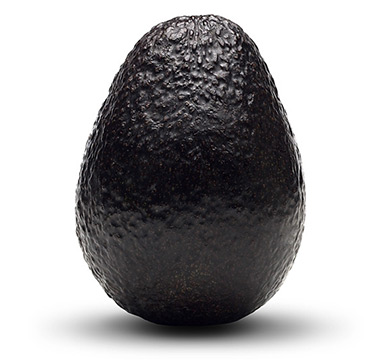
Hass Avocado Board Supports Nutrition Research
The Hass Avocado Board (HAB) is a promotion, research and information organization under supervision of the United States Department of Agriculture. HAB has a science research pipeline of ongoing clinical studies investigating the relationship between fresh avocado consumption and weight management and risk factors for cardiovascular disease and diabetes. And, based on their nutrition and phytochemical components, emerging research suggests that avocados may play benefit many emerging areas, including skin, eye, joint and cellular health.
1. Mahmassani, H., Avendano, E., Gowri, R. and E.J. Johnson. Avocado consumption increases and risk factors for heart disease: A systematic review and meta-analysis. AJCN 2018.


